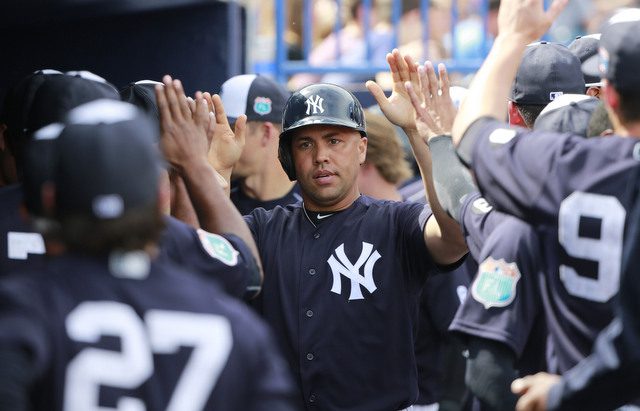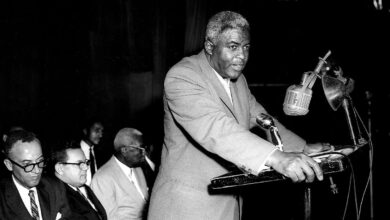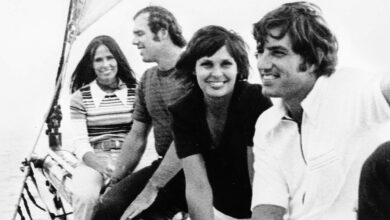


Carlos Beltran is an accomplished big-league superstar and a longtime Latino icon, especially in his native Puerto Rico. Now 38 and in the final year of his deal with the New York Yankees, Carlos Beltran doesn’t seem concerned that an illustrious career might come to an end after 19 seasons. He’s off to a good start, even if the Yankees are not. While always competitive, the mood is relaxed and upbeat.
You see, Carlos Beltran has always put others before himself. A man of faith, he has developed a lasting inner peace, which is all that really matters. When baseball recently celebrated its annual “Jackie Robinson Day,” Beltran sat beside his locker, with reporters all ears, as he shared stories about the great Roberto Clemente. Hoping to rally support, he wondered out loud if Puerto Rico’s favorite son would ever get his number 21 retired from the game, like Jackie’s number 42 has been honored.
“I don’t know if it’s going to happen or not, but it would be beautiful,” Carlos lobbied.
Out of respect for both men, most in the audience agreed, and for good reason.
Clemente was the first Latino to be enshrined in baseball’s Hall of Fame. Like Robinson, he was instrumental in breaking down the barriers of color, but also of race. That’s why the legendary Pittsburgh Pirates right fielder is worshiped by today’s Hispanic stars, even though he was tragically killed before they were born.
“He did so much for minority players,” noted Beltran. “He deserves to be recognized.”
The bold suggestion has met some resistance by commissioner Rob Manfred. But another idea floated by Beltran in the spring of 2015 hit the wall and stuck. It started with a conversation Carlos Beltran had with Yankees general manager Brian Cashman. The topic of interpreters for Japanese players came up, and Carlos mentioned how great it would be for Hispanics to have the same courtesy. Later, Beltran approached MLPA president Tony Clark with the idea, and the pair took the proposal to Manfred. As a result, every MLB team must now employ Spanish translators for the game’s large Latino work force, which stands at 30 percent and growing. Understandably, the new requirement is informally known by players and coaches as the “Carlos Beltran rule.”
“When I first came up to the big leagues in 1998, I knew little of English and didn’t do many interviews,” Beltran revealed. “Every Latino who plays at this level wants to learn English and get better, but it takes time. This is something that was needed and long overdue.”
Growing up in Puerto Rico presents many financial challenges, which is why Beltran has a desire to give back. In 2011, he started the Carlos Beltran Baseball Academy with $4 million of his own money. Under the umbrella of the Carlos Beltran Foundation, the bilingual learning institution is spread over 18 acres on the island and stresses education as well as baseball. The school is Beltran’s passion, and his daily presence on campus during the offseason sends a powerful message of commitment to students.
“These kids understand that this is an opportunity that doesn’t come to everyone,” says Carlos. “Now they have a place to both study and play baseball.”
In the twilight of his playing days, Carlos Beltran has come to realize that he has been blessed with special skills that have made him successful. Hence, he has developed a unique relationship with God and wants his students to follow a similar path at an earlier age.
“We pray before classes and pray before practice, and we select a different kid each day to take the lead (in prayer),” confirms Beltran. “We want them to understand the importance of having God in their lives.”
Carlos Beltran is certain to surpass several personal milestones this year with the Yankees, including 2,500 hits, 400 home runs and 1,500 RBI. Those are numbers worthy of Cooperstown consideration, especially for a switch-hitter with a combined lifetime batting average of .280 and over 300 stolen bases. The fact Carlos Beltran has played for four different teams in the last five years could be seen as a negative, but it has also given him the chance to pass along some valuable veteran wisdom to a larger variety of young talent.
While Beltran had some amazing years with the Kansas City Royals and the New York Mets, his most memorable season to date was with the St. Louis Cardinals in 2013. That was when he was presented with the Roberto Clemente Award, an annual tribute to MLB players who best exemplifies baseball sportsmanship, community involvement and team contributions. It was also the year Carlos came closest to winning a World Series ring, and the influence he had on his teammates was extraordinary. One of those guys was a young Jon Jay, a Cuban-American outfielder who is now a role model for the San Diego Padres.
“He’s a good leader and knows how to talk to players,” says Jay of his relationship with Beltran. “I consider Carlos a friend and someone who has had a big impact on my career.”
That’s a role Carlos Beltran hopes to accomplish in what could be his swan song in the Bronx – as a teacher, leading by example and making a difference, whether it be on the field or in the clubhouse. What the future holds is up to a higher power, and Carlos is perfectly fine with that scenario.




